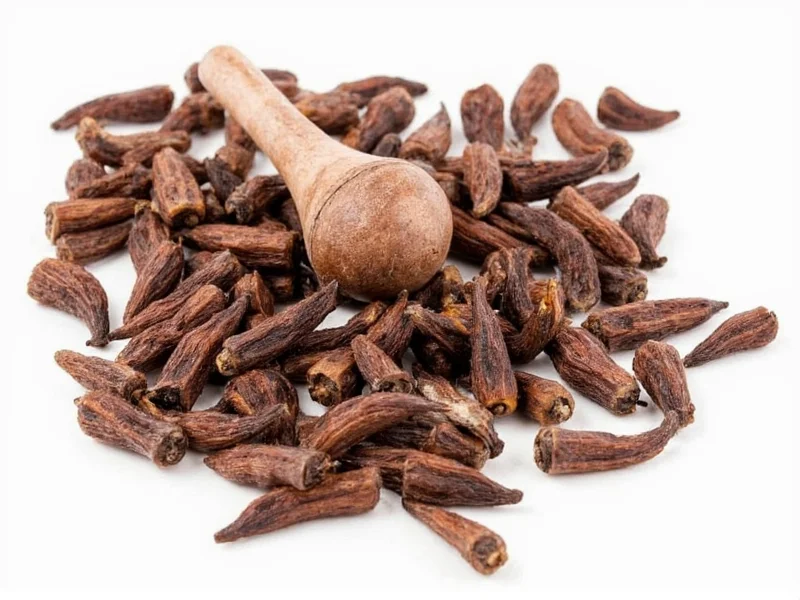When you're in the middle of preparing a recipe and realize you've run out of cloves, knowing reliable substitutes can save your dish. Cloves offer a distinctive warm, sweet-spicy flavor with hints of citrus and bitterness, making them challenging to replace perfectly. However, several common pantry spices can effectively mimic cloves' complex profile when used correctly. Understanding which substitute works best depends on your specific recipe and the role cloves play in your dish.
Understanding Cloves' Unique Flavor Profile
Cloves contain eugenol, the compound responsible for their intense, warming sensation and distinctive aroma. This powerful flavor can dominate a dish when used excessively, which is why precise substitution ratios matter. Unlike many spices, cloves don't have a single perfect replacement because they contribute multiple flavor dimensions: sweet, spicy, slightly bitter, and medicinal. The best substitute depends on whether you're making baked goods, savory dishes, beverages, or preserves.
Top Clove Substitutes with Exact Ratios
Successful substitution requires understanding both flavor compatibility and proper measurement. Using too much of a substitute can ruin your dish, while too little won't provide adequate flavor replacement. Here are the most effective alternatives with precise ratios:
| Substitute | Ratio (for 1.5 tsp cloves) | Best For | Flavor Notes |
|---|---|---|---|
| Allspice | 1/4 tsp | Baking, mulled drinks, stews | Most similar single-substitute option with warm, complex flavor |
| Cinnamon | 1/2 tsp | Baking, rice pudding, chai | Sweeter, less medicinal than cloves |
| Nutmeg | 1/3 tsp | Custards, creamy sauces, mashed potatoes | Earthy, nutty flavor; use sparingly |
| Cardamom | 1/4 tsp | Indian dishes, Scandinavian baking | Citrusy, floral notes; complements cloves well |
| Pumpkin pie spice | 1/2 tsp | Pies, cakes, quick breads | Pre-blended alternative with balanced warm spices |
Specialized Substitutes for Specific Applications
Clove Oil for Intense Flavor
Clove oil provides concentrated flavor but requires careful handling. Use just 1 drop of clove oil to replace 1/4 teaspoon of ground cloves. Always dilute clove oil in a liquid ingredient first—never add it directly to dry ingredients. This substitute works best in liquid-based recipes like mulled wine, syrups, or marinades where the oil can disperse evenly.
Star Anise for Savory Dishes
When substituting cloves in braises, stews, or Chinese five-spice applications, star anise makes an excellent alternative. Use 1 whole star anise pod to replace 4-6 whole cloves. Remove the pod before serving, as it remains too tough to eat. Star anise provides similar warming properties with a distinct licorice note that complements meats beautifully.
Homemade Clove Substitute Blends
For the most accurate flavor replacement, create custom blends tailored to your recipe:
- For baking: Combine 1/8 teaspoon ground cinnamon, 1/8 teaspoon ground nutmeg, and 1/16 teaspoon ground allspice
- For savory dishes: Mix 1/4 teaspoon ground allspice with a pinch of ground black pepper
- For beverages: Use 1/4 teaspoon cinnamon with 1/16 teaspoon ground ginger
What NOT to Use as Clove Substitutes
Certain spices create flavor imbalances when substituting for cloves. Avoid using pure ginger alone, as its sharp heat lacks cloves' warmth. Pure mace works poorly as it's too subtle. Never substitute whole cloves with an equal amount of ground cloves—this common mistake results in overpowering flavor. Remember that nutmeg alone can become bitter if overused as a clove substitute.
Selecting the Right Substitute by Dish Type
The best clove alternative depends on your specific recipe. For gingerbread, pumpkin pie, or other baked goods, cinnamon or pumpkin pie spice provides sufficient warmth without overwhelming other flavors. When making biryani or other Indian dishes where cloves play a supporting role among many spices, allspice maintains the complex spice profile. For pickling recipes where cloves provide essential antimicrobial properties, consider adding a small piece of cinnamon stick alongside other substitutes to help preserve your pickles.
Adjusting Recipes When Substituting Cloves
When replacing cloves, consider these professional adjustments to maintain recipe balance:
- Reduce sugar slightly when using cinnamon substitutes, as cinnamon tastes sweeter than cloves
- Add a tiny pinch of black pepper to allspice substitutions to mimic cloves' slight heat
- For meat rubs, increase the substitute quantity by 25% since dry spices concentrate during cooking
- When substituting in liquid recipes, add substitutes early to allow flavors to meld properly











 浙公网安备
33010002000092号
浙公网安备
33010002000092号 浙B2-20120091-4
浙B2-20120091-4